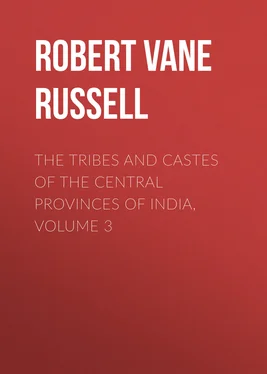Robert Vane Russell - The Tribes and Castes of the Central Provinces of India, Volume 3
Здесь есть возможность читать онлайн «Robert Vane Russell - The Tribes and Castes of the Central Provinces of India, Volume 3» — ознакомительный отрывок электронной книги совершенно бесплатно, а после прочтения отрывка купить полную версию. В некоторых случаях можно слушать аудио, скачать через торрент в формате fb2 и присутствует краткое содержание. Жанр: foreign_prose, История, foreign_edu, foreign_antique, на английском языке. Описание произведения, (предисловие) а так же отзывы посетителей доступны на портале библиотеки ЛибКат.
- Название:The Tribes and Castes of the Central Provinces of India, Volume 3
- Автор:
- Жанр:
- Год:неизвестен
- ISBN:нет данных
- Рейтинг книги:5 / 5. Голосов: 1
-
Избранное:Добавить в избранное
- Отзывы:
-
Ваша оценка:
- 100
- 1
- 2
- 3
- 4
- 5
The Tribes and Castes of the Central Provinces of India, Volume 3: краткое содержание, описание и аннотация
Предлагаем к чтению аннотацию, описание, краткое содержание или предисловие (зависит от того, что написал сам автор книги «The Tribes and Castes of the Central Provinces of India, Volume 3»). Если вы не нашли необходимую информацию о книге — напишите в комментариях, мы постараемся отыскать её.
The Tribes and Castes of the Central Provinces of India, Volume 3 — читать онлайн ознакомительный отрывок
Ниже представлен текст книги, разбитый по страницам. Система сохранения места последней прочитанной страницы, позволяет с удобством читать онлайн бесплатно книгу «The Tribes and Castes of the Central Provinces of India, Volume 3», без необходимости каждый раз заново искать на чём Вы остановились. Поставьте закладку, и сможете в любой момент перейти на страницу, на которой закончили чтение.
Интервал:
Закладка:
But the god Bhagwān became aware that Lingo was not praying to him as usual, and sent the crow Kageshwar to look for him. The crow came and reported that Lingo was dead, and the god sent him back with nectar to sprinkle it over the body and bring it to life again, which was done.
10. He releases the Gonds shut up in the cave and constitutes the tribe
Lingo then thought he had had enough of the four brothers, so he determined to go and find the other sixteen score Gonds who were imprisoned somewhere as the brothers had told him. The manner of his doing this may be told in Captain Forsyth’s version: 51 51 This extract is reproduced by permission of the publishers, Messrs. Chapman & Hall, London.
And our Lingo redivivus
Wandered on across the mountains,
Wandered sadly through the forest
Till the darkening of the evening,
Wandered on until the night fell.
Screamed the panther in the forest,
Growled the bear upon the mountain,
And our Lingo then bethought him
Of their cannibal propensities.
Saw at hand the tree Niruda,
Clambered up into its branches.
Darkness fell upon the forest,
Bears their heads wagged, yelled the jackal
Kolyal, the King of Jackals.
Sounded loud their dreadful voices
In the forest-shade primeval.
Then the Jungle-Cock Gugotee,
Mull the Peacock, Kurs the Wild Deer,
Terror-stricken, screeched and shuddered,
In that forest-shade primeval.
But the moon arose at midnight,
Poured her flood of silver radiance,
Lighted all the forest arches,
Through their gloomy branches slanting;
Fell on Lingo, pondering deeply
On his sixteen scores of Koitūrs.
Then thought Lingo, I will ask her
For my sixteen scores of Koitūrs.
‘Tell me, O Moon!’ said Lingo,
‘Tell, O Brightener of the darkness!
Where my sixteen scores are hidden.’
But the Moon sailed onwards, upwards,
And her cold and glancing moonbeams
Said, ‘Your Gonds, I have not seen them.’
And the Stars came forth and twinkled
Twinkling eyes above the forest.
Lingo said, “O Stars that twinkle!
Eyes that look into the darkness,
Tell me where my sixteen scores are.”
But the cold Stars twinkling ever,
Said, ‘Your Gonds, we have not seen them.’
Broke the morning, the sky reddened,
Faded out the star of morning,
Rose the Sun above the forest,
Brilliant Sun, the Lord of morning,
And our Lingo quick descended,
Quickly ran he to the eastward,
Fell before the Lord of Morning,
Gave the Great Sun salutation—
‘Tell, O Sun!’ he said, ‘Discover
Where my sixteen scores of Gonds are.’
But the Lord of Day reply made—
“Hear, O Lingo, I a Pilgrim
Wander onwards, through four watches
Serving God, I have seen nothing
Of your sixteen scores of Koitūrs.”
Then our Lingo wandered onwards
Through the arches of the forest;
Wandered on until before him
Saw the grotto of a hermit,
Old and sage, the Black Kumāit,
He the very wise and knowing,
He the greatest of Magicians,
Born in days that are forgotten,
In the unremembered ages,
Salutation gave and asked him—
‘Tell, O Hermit! Great Kumāit!
Where my sixteen scores of Gonds are.
Then replied the Black Magician,
Spake disdainfully in this wise—
“Lingo, hear, your Gonds are asses
Eating cats, and mice, and bandicoots,
Eating pigs, and cows, and buffaloes;
Filthy wretches! wherefore ask me?
If you wish it I will tell you.
Our great Mahādeva caught them,
And has shut them up securely
In a cave within the bowels
Of his mountain Dewalgiri,
With a stone of sixteen cubits,
And his bulldog fierce Basmāsur;
Serve them right, too, I consider,
Filthy, casteless, stinking wretches!”
And the Hermit to his grotto
Back returned, and deeply pondered
On the days that are forgotten,
On the unremembered ages.
But our Lingo wandered onwards,
Fasting, praying, doing penance;
Laid him on a bed of prickles,
Thorns long and sharp and piercing.
Fasting lay he devotee-like,
Hand not lifting, foot not lifting,
Eye not opening, nothing seeing.
Twelve months long thus lay and fasted,
Till his flesh was dry and withered,
And the bones began to show through.
Then the great god Mahādeva
Felt his seat begin to tremble,
Felt his golden stool, all shaking
From the penance of our Lingo.
Felt, and wondered who on earth
This devotee was that was fasting
Till his golden stool was shaking.
Stepped he down from Dewalgiri,
Came and saw that bed of prickles
Where our Lingo lay unmoving.
Asked him what his little game was,
Why his golden stool was shaking.
Answered Lingo, “Mighty Ruler!
Nothing less will stop that shaking
Than my sixteen scores of Koitūrs
Rendered up all safe and hurtless
From your cave in Dewalgiri.”
Then the Great God, much disgusted,
Offered all he had to Lingo,
Offered kingdom, name, and riches,
Offered anything he wished for,
‘Only leave your stinking Koitūrs
Well shut up in Dewalgiri.’
But our Lingo all refusing
Would have nothing but his Koitūrs;
Gave a turn to run the thorns a
Little deeper in his midriff.
Winced the Great God: “Very well, then,
Take your Gonds—but first a favour.
By the shore of the Black Water
Lives a bird they call Black Bindo,
Much I wish to see his young ones,
Little Bindos from the sea-shore;
For an offering bring these Bindos,
Then your Gonds take from my mountain.”
Then our Lingo rose and wandered,
Wandered onwards through the forest,
Till he reached the sounding sea-shore,
Reached the brink of the Black Water,
Found the Bingo birds were absent
From their nest upon the sea-shore,
Absent hunting in the forest,
Hunting elephants prodigious,
Which they killed and took their brains out,
Cracked their skulls, and brought their brains to
Feed their callow little Bindos,
Wailing sadly by the sea-shore.
Seven times a fearful serpent,
Bhawarnāg the horrid serpent,
Serpent born in ocean’s caverns,
Coming forth from the Black Water,
Had devoured the little Bindos—
Broods of callow little Bindos
Wailing sadly by the sea-shore—
In the absence of their parents.
Eighth this brood was. Stood our Lingo,
Stood he pondering beside them—
“If I take these little wretches
In the absence of their parents
They will call me thief and robber.
No! I’ll wait till they come back here.”
Then he laid him down and slumbered
By the little wailing Bindos.
As he slept the dreadful serpent,
Rising, came from the Black Water,
Came to eat the callow Bindos,
In the absence of their parents.
Came he trunk-like from the waters,
Came with fearful jaws distended,
Huge and horrid, like a basket
For the winnowing of corn.
Rose a hood of vast dimensions
O’er his fierce and dreadful visage.
Shrieked the Bindos young and callow,
Gave a cry of lamentation;
Rose our Lingo; saw the monster;
Drew an arrow from his quiver,
Shot it swift into his stomach,
Sharp and cutting in the stomach,
Then another and another;
Cleft him into seven pieces,
Wriggled all the seven pieces,
Wriggled backward to the water.
But our Lingo, swift advancing,
Seized the headpiece in his arms,
Knocked the brains out on a boulder;
Laid it down beside the Bindos,
Callow, wailing, little Bindos.
On it laid him, like a pillow,
And began again to slumber.
Soon returned the parent Bindos
From their hunting in the forest;
Bringing brains and eyes of camels
And of elephants prodigious,
For their little callow Bindos
Wailing sadly by the sea-shore.
But the Bindos young and callow
Brains of camels would not swallow;
Said—“A pretty set of parents
You are truly! thus to leave us
Sadly wailing by the sea-shore
To be eaten by the serpent—
Bhawarnāg the dreadful serpent—
Came he up from the Black Water,
Came to eat us little Bindos,
When this very valiant Lingo
Shot an arrow in his stomach,
Cut him into seven pieces—
Give to Lingo brains of camels,
Eyes of elephants prodigious.”
Then the fond paternal Bindo
Saw the head-piece of the serpent
Under Lingo’s head a pillow,
And he said, ‘O valiant Lingo,
Ask whatever you may wish for.’
Then he asked the little Bindos
For an offering to the Great God,
And the fond paternal Bindo,
Much disgusted first refusing,
Soon consented; said he’d go too
With the fond maternal Bindo—
Take them all upon his shoulders,
And fly straight to Dewalgiri.
Then he spread his mighty pinions,
Took his Bindos up on one side
And our Lingo on the other.
Thus they soared away together
From the shores of the Black Water,
And the fond maternal Bindo,
O’er them hovering, spread an awning
With her broad and mighty pinions
O’er her offspring and our Lingo.
By the forests and the mountains
Six months’ journey was it thither
To the mountain Dewalgiri.
Half the day was scarcely over
Ere this convoy from the sea-shore
Lighted safe on Dewalgiri;
Touched the knocker to the gateway
Of the Great God, Mahādeva.
And the messenger Nārāyan
Answering, went and told his master—
“Lo, this very valiant Lingo!
Here he is with all the Bindos,
The Black Bindos from the sea-shore.”
Then the Great God, much disgusted,
Driven quite into a corner,
Took our Lingo to the cavern,
Sent Basmāsur to his kennel,
Held his nose, and moved away the
Mighty stone of sixteen cubits;
Called those sixteen scores of Gonds out
Made them over to their Lingo.
And they said, “O Father Lingo!
What a bad time we’ve had of it,
Not a thing to fill our bellies
In this horrid gloomy dungeon.”
But our Lingo gave them dinner,
Gave them rice and flour of millet,
And they went off to the river,
Had a drink, and cooked and ate it.
Интервал:
Закладка:
Похожие книги на «The Tribes and Castes of the Central Provinces of India, Volume 3»
Представляем Вашему вниманию похожие книги на «The Tribes and Castes of the Central Provinces of India, Volume 3» списком для выбора. Мы отобрали схожую по названию и смыслу литературу в надежде предоставить читателям больше вариантов отыскать новые, интересные, ещё непрочитанные произведения.
Обсуждение, отзывы о книге «The Tribes and Castes of the Central Provinces of India, Volume 3» и просто собственные мнения читателей. Оставьте ваши комментарии, напишите, что Вы думаете о произведении, его смысле или главных героях. Укажите что конкретно понравилось, а что нет, и почему Вы так считаете.












